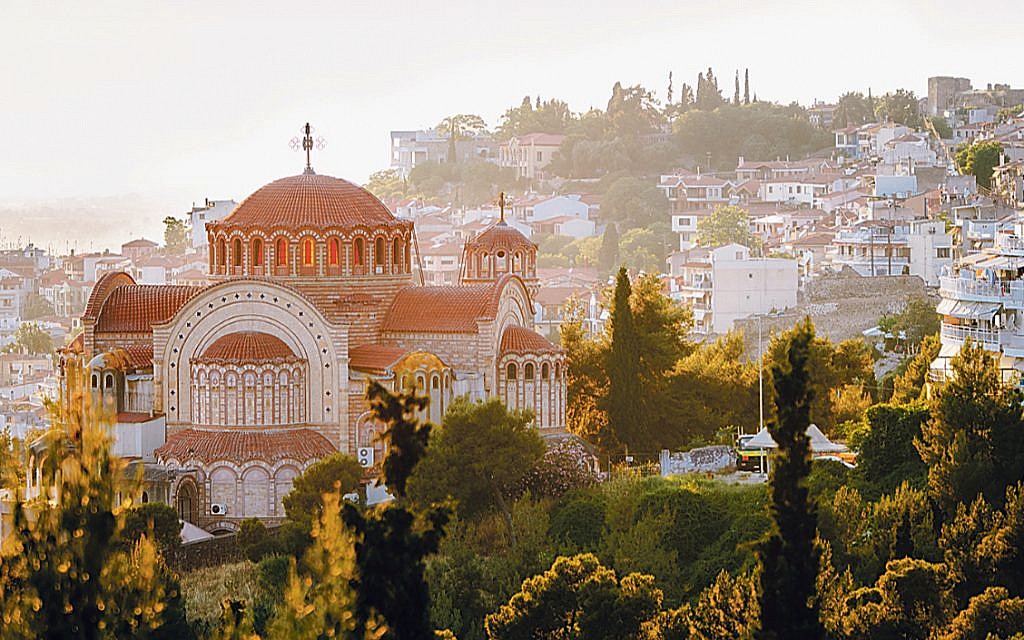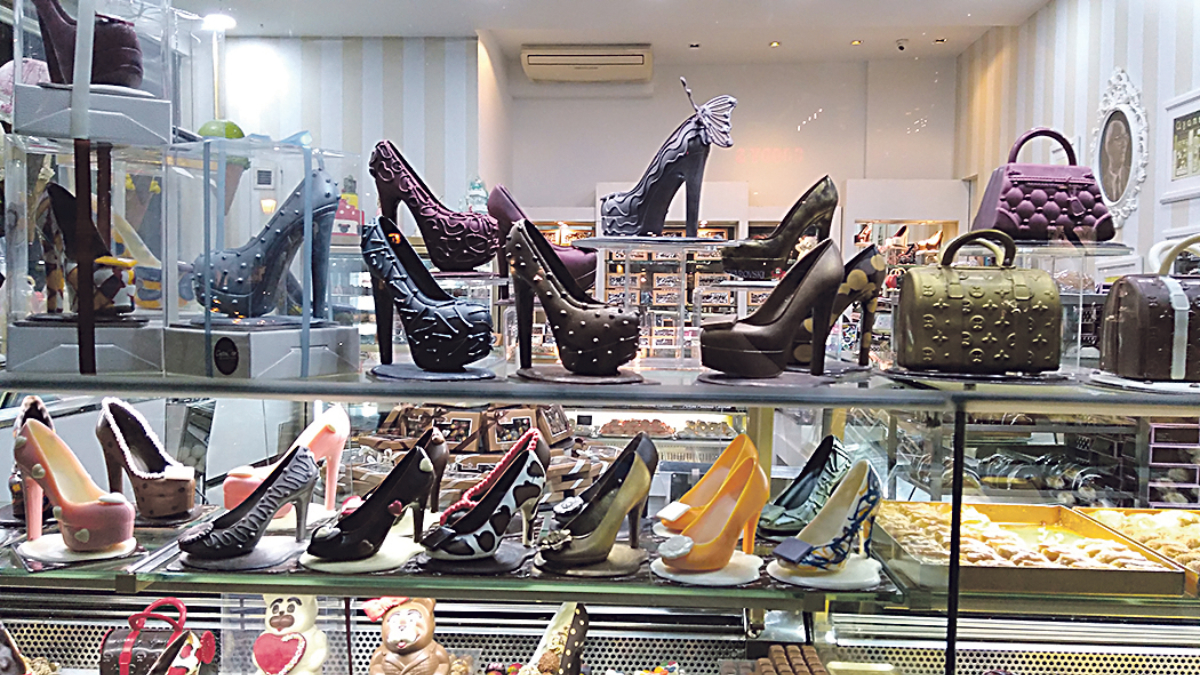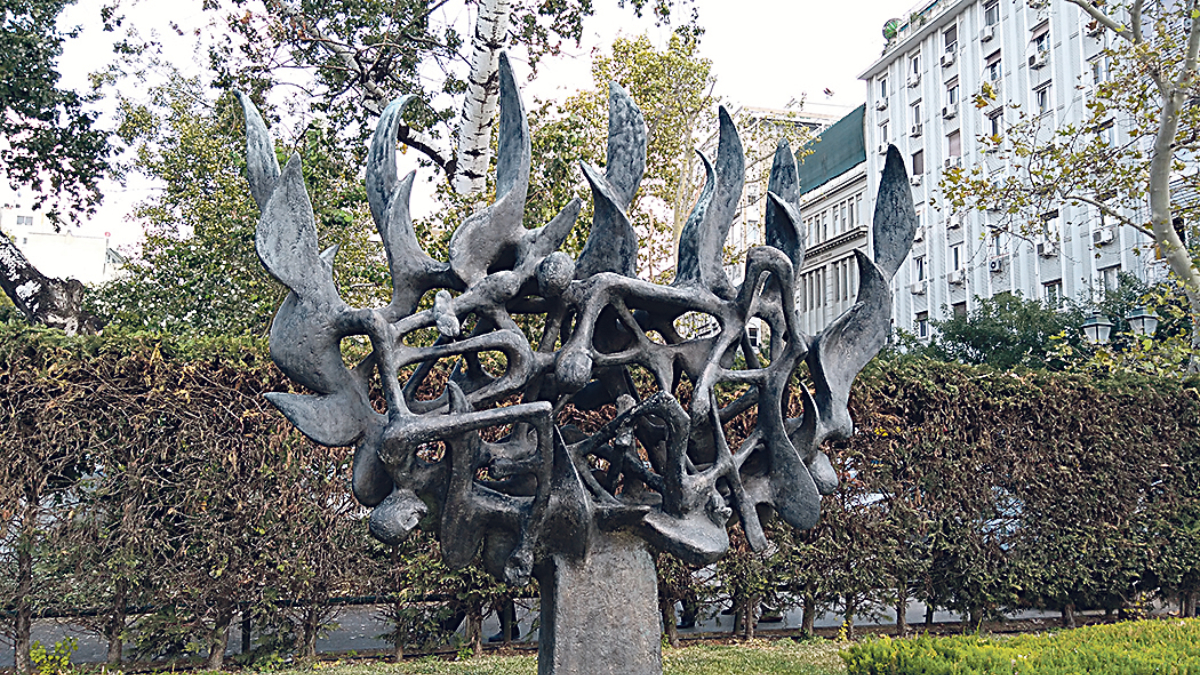Feta attraction in Thessaloniki!
Lucy Daltroff explores the cultural delights of Greece and discovers the history of its Jewish community!
It’s a moment of pure theatre: The Friday night service has just ended and, as the children are being led out in single file, a little boy aged four puts a finger to his lips and blows a kiss to his great grandmother, just visible in the gap of the mechitza.
I am in Thessaloniki (also known as Thessalonica), Greece on a trip arranged by Milk and Honey Tours, witnessing the warmth of Jewish family life in its main busy shul.
In the few hours I’ve been here, I’m learning that to understand Jewish history properly, a visit to this second city of Greece is essential. After all, even the word “synagogue” originally comes from the Greek synagoge, meaning ‘place of assembly ’.
Get The Jewish News Daily Edition by email and never miss our top stories Free Sign Up
My first impression of Thessaloniki is not of beauty, but of charm. It’s simply bursting with different cultures. This is reflected in the architecture, which ranges between Roman, Byzantine and Ottoman. A Roman Agora (central public space) dominates the town.
This is all despite a devastating fire, which ravaged in August 1917 and destroyed two-thirds of the city. It was rebuilt to a set plan, with its centre on the architecturally-pleasing Aristotelous Square, which leads on to the long attractive paralia or promenade, built on the original walls.
Thessaloniki makes it slightly unusual as there is no beach; just the wall and then sea. It’s also a busy promenade: besides walkers, I found myself among a bustling crowd that included photographers, cyclists and people doing their daily exercise.
At one end of this long walkway is the spectacular and iconic White Tower, the symbol of the city. It was put up by the Ottomans in 1430, originally as a fortification, although later it became a notorious prison. Now it’s a museum of the town’s history. Nearby, spectacular pirate-looking boats take visitors for trips along the coast.
At the other end is the busy port, the second largest in Greece – and in between a vast number of coffee shops, and authentic open air cafés, a tribute to what is very much a living city, without souvenirs or tourist menus. Thessaloniki suffered from the economic crisis, but somehow it doesn’t seem to have affected its energy.
There are many museums, but two stand out: the Archaeological Museum and the one covering Byzantine Culture, both containing astonishing collections that are easy to understand, with captions in English, as well as in Greek.
Then there are the shops. Everywhere, top international stores sit alongside quirky luxury brands. I walked past one I thought sold shoes, until I saw that all the high-heeled elegance was actually made of chocolate!
A particular good excursion is to go by bus or car to the upper town, via the twisting Ottoman-era roads, and take in an overall view, which stretches over the whole metropolis with Mount Olympus in the distance.
Yet with all its attractions, it is the Jewish history of Thessaloniki that really sets this place apart. There is evidence of a Greek-speaking Jewish presence here as early as the second century BCE, who followed their own ancient rituals.
Later, there is information showing that the most ancient synagogue was visited by Paul of Tarsus in the first century.
Then the Romaniote Jews settled in the city with their distinct language of Judaeo-Greek (a Greek dialect that contained Hebrew, along with some Aramaic and Turkish), but by far the largest influx was during the 15th and 16th centuries from those fleeing the Inquisitions in both Spain, and later, Portugal.
More than 20,000 Sephardic Jews immigrated to Greece as a whole, so that in 1519 Jewish numbers in Thessaloniki topped 16,000 – more than half of the city.
All the different communities had their own synagogues with the Sephardic and Romaniotes speaking different languages.
Even as late as 1902, the Ottoman Government census shows 62,000 Jewish inhabitants. It was so Jewish that the busy port was closed for business on a Saturday.
The lecturer on our tour, Professor Rena Molho, explained that the community was far from wealthy; all the basic jobs, from porters to dock workers were carried out by Jewish employees. This all ended in 1943, however, when the Nazis began forcing every Jewish citizen into a ghetto and then mass deportation to the concentration camps. Ninety-six per cent of Thessaloniki’s Jewish population perished.
The Jewish Community Holocaust Memorial was put up in 1997 in Eleftherias (“Freedom”) Square, and on the day I visited, a large crowd had gathered to pay their respects.
Today, the Thessaloniki community numbers 1,200 (compared to 3,000 in Athens). On high holy days, services spill over into another shul. The attractive Monastirlis Synagogue built in 1925 with funding from the Jewish community of Monastir (in former Yugoslavia) was spared destruction during the Second World War, because it was used by the Red Cross.
Now an even bigger project is scheduled: A museum will be built, to open in 2020, with exhibitions devoted to the culture and history of the community. The Greek railways donated land overlooking the railway station where the deportations took place, and €22 million (£19.4m) was raised to fund the building.
Mayor Yannis Boutaris has called the plan “a fulfilment of a historic responsibility for Thessaloniki”. He added: “Only in this way will we be able to have a greater awareness of what this crime means and why it should not be repeated.”
Lucy’s travel tips
Lucy was a guest of Milk and Honey Tours (milkandhoneytours.com), which specialises in guided Jewish tours to more than 60 destinations across Europe. She stayed at the Electra Palace Hotel, Thessaloniki
(www.electrahotels.gr/en/thessaloniki/electra-palace-thessaloniki).

Thank you for helping to make Jewish News the leading source of news and opinion for the UK Jewish community. Today we're asking for your invaluable help to continue putting our community first in everything we do.
For as little as £5 a month you can help sustain the vital work we do in celebrating and standing up for Jewish life in Britain.
Jewish News holds our community together and keeps us connected. Like a synagogue, it’s where people turn to feel part of something bigger. It also proudly shows the rest of Britain the vibrancy and rich culture of modern Jewish life.
You can make a quick and easy one-off or monthly contribution of £5, £10, £20 or any other sum you’re comfortable with.
100% of your donation will help us continue celebrating our community, in all its dynamic diversity...
Engaging
Being a community platform means so much more than producing a newspaper and website. One of our proudest roles is media partnering with our invaluable charities to amplify the outstanding work they do to help us all.
Celebrating
There’s no shortage of oys in the world but Jewish News takes every opportunity to celebrate the joys too, through projects like Night of Heroes, 40 Under 40 and other compelling countdowns that make the community kvell with pride.
Pioneering
In the first collaboration between media outlets from different faiths, Jewish News worked with British Muslim TV and Church Times to produce a list of young activists leading the way on interfaith understanding.
Campaigning
Royal Mail issued a stamp honouring Holocaust hero Sir Nicholas Winton after a Jewish News campaign attracted more than 100,000 backers. Jewish Newsalso produces special editions of the paper highlighting pressing issues including mental health and Holocaust remembrance.
Easy access
In an age when news is readily accessible, Jewish News provides high-quality content free online and offline, removing any financial barriers to connecting people.
Voice of our community to wider society
The Jewish News team regularly appears on TV, radio and on the pages of the national press to comment on stories about the Jewish community. Easy access to the paper on the streets of London also means Jewish News provides an invaluable window into the community for the country at large.
We hope you agree all this is worth preserving.
-
By Brigit Grant
-
By Laurent Vaughan - Senior Associate (Bishop & Sewell Solicitors)
-
By Laurent Vaughan - Senior Associate (Bishop & Sewell Solicitors)
-
By Laurent Vaughan - Senior Associate (Bishop & Sewell Solicitors)
-
By Laurent Vaughan - Senior Associate (Bishop & Sewell Solicitors)
























